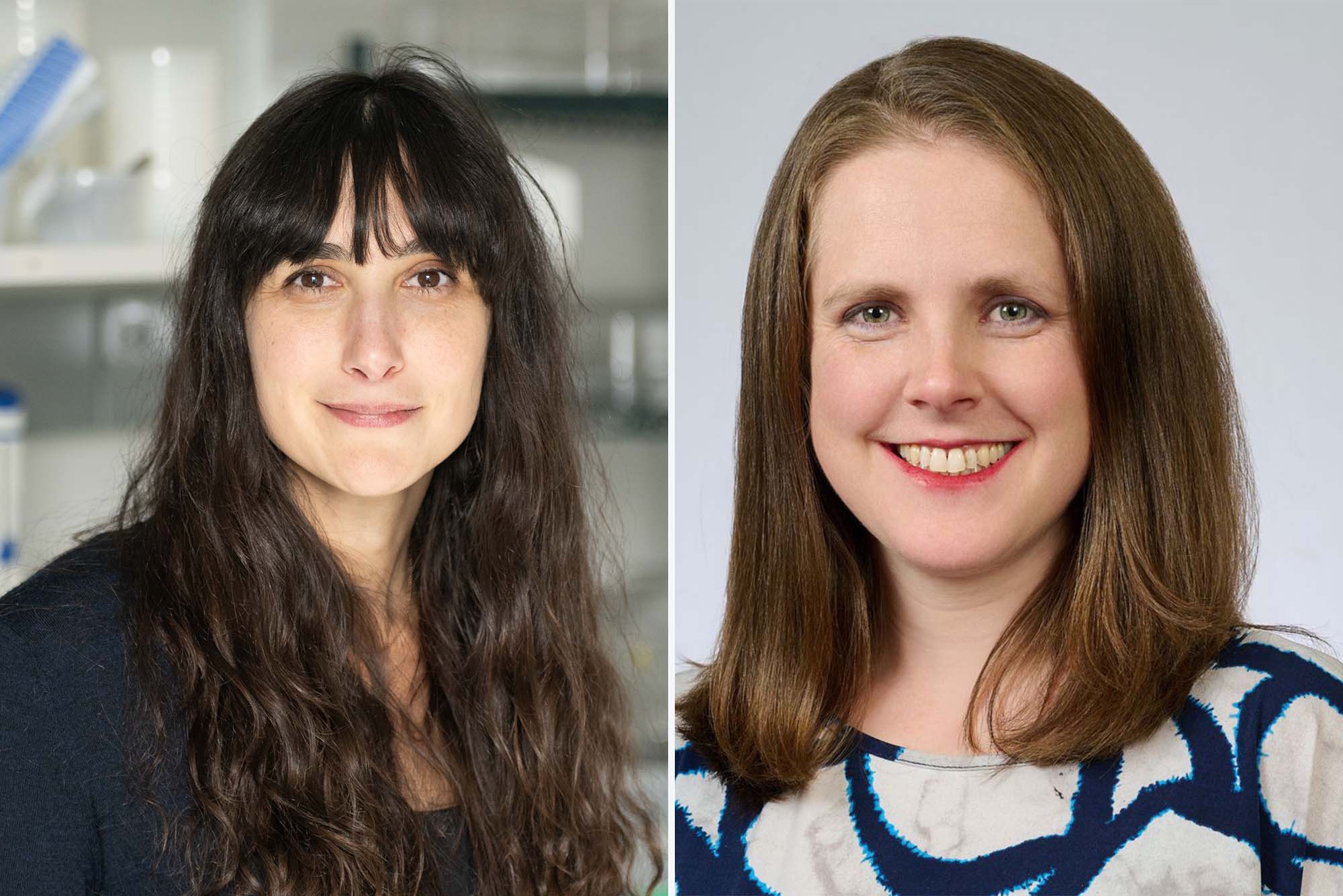NIH Honors Two BU Researchers for Exceptionally Creative, High-Impact Science

Meg Younger (left) and Julia Bond received NIH Director’s Awards to bolster their research. Younger photo by Cydney Scott, Bond photo provided by Bond
NIH Honors Two BU Researchers for Exceptionally Creative, High-Impact Science
The prestigious Director’s Awards will support work studying sexual health and stopping mosquito bites
Two Boston University researchers have received prestigious awards from the National Institutes of Health (NIH) for their efforts to improve sexual well-being and to stop mosquitoes from biting us.
Julia Bond (SPH’24), a BU School of Public Health assistant professor (appointment pending) of epidemiology, has been awarded the NIH Director’s Early Independence Award. It “supports promising, newly graduated scientists” with “intellect, scientific creativity, drive, and maturity” in jumping right into independent research careers, skipping the traditional postdoc route. She’ll use the award’s funding—up to $250,000 annually, for up to five years—to study how sexual wellness prior to pregnancy is linked to conception.
Meg Younger, a BU College of Arts & Sciences assistant professor of biology, received the NIH Director’s New Innovator Award, which is for “exceptionally creative early career scientists proposing innovative, high-impact projects”; it comes with $475,000 annually for five years. She’ll use the funding to investigate new techniques for unraveling the sophisticated sense of smell that allows mosquitoes to track down humans to bite. Younger is also affiliated with BU’s Neurophotonics Center and Center for Systems Neuroscience.
The Brink sat down with Bond and Younger to learn more about their work and understand the impact of their NIH-funded research.
Q&A
with Julia Bond and Meg Younger
A Healthy Sex Life Before and After Pregnancy
The Brink: The Brink: What’s the focus of your research?
Bond: My research focus broadly is how to support sexual well-being throughout the life course. One of the areas I have been researching is the relationship between sexual function and how long it takes a couple to conceive. Right now, there is very little known about the role that sexual function, like arousal level or orgasm, plays in conception. With SPH’s Pregnancy Study Online (PRESTO), we have found that almost 25 percent of our female participants met the threshold for sexual dysfunction, and one in three had experienced recent painful intercourse. Yet, very few of these participants had raised any concerns with their physicians.
The Brink: What motivates you to do this work?
Bond: I don’t like the idea that people often suffer in silence through uncomfortable, painful, or unpleasant sex to try to achieve their family planning goals. But without much research in the area it’s hard to know what might help. This NIH award will support my collecting more detailed data about sexual function prior to pregnancy, so I can more accurately assess how it might be linked to conception.
The Brink: What do you hope will be the societal impact of your work?
Bond: If there is a connection between sexual function and conception, then there may be an opportunity for clinical interventions to help couples trying to conceive. This award will also enable me to gain a deeper understanding of how the transition from pregnancy planning to pregnancy to parenthood affects sexual function, which I think will be really important to ultimately understanding how to support people in having the sex lives and relationships they want during this life stage. I hope this work will help elevate sexual function and sexual well-being as an important part of family planning—not necessarily just for the mechanics of becoming pregnant, but also to support the well-being of the couple over the long term.
Studying Mosquitoes’ Sense of Smell to Improve Repellents
The Brink: What’s the focus of your research?
Younger: Mosquitoes rely heavily on their sense of smell when they’re looking for a person to bite. My lab is focused on understanding how their sense of smell works. We’ve made substantial progress on understanding how the peripheral nervous system works—including the receptors that detect different odors, and the neurons that house those receptors. But we know little about what happens in the brain after that. We want to move beyond the periphery and deeper into the brain to look at the circuits mosquitoes use to encode the odor, not just to detect the odor.
The Brink: How will this award help you advance your work?
Younger: To study neurons that come in contact with odors directly, we cut a tiny hole onto the mosquito exoskeleton, and engineer the neurons to glow when activated. We have devices to give precise, controlled odors to the mosquito, and we image the brain at BU’s Neurophotonics Center. Beyond that, there are no methods currently that allow us to look at activity in the next, deeper level of neurons. With this award, we’re working to develop genetic strategies that allow us to look at not just the neurons that come in contact with the world, but also the circuits that are encoding that information, and ultimately leading to the behavior of the mosquito.
The Brink: What do you hope will be the societal impact of your work?
Younger: It’s really hard to stop mosquitoes from biting people. The better we understand mosquito olfaction, the more we realize that they use a lot of different mechanisms. This makes it really hard to find a new chemical that’ll stop them—because even if you block one smell, they’ll just use another. If we study the way all of the scent information comes together in the brain—the areas in the brain that represent humans to a mosquito—we could then use that information to come up with new creative ways to block them from recognizing us.
Interviews were edited for length and clarity.
